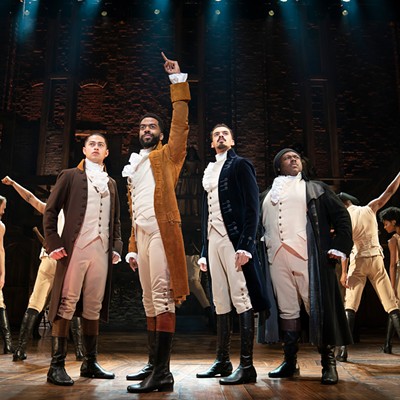Wednesday, April 26, 2017
ACLU report highlights unique policing policy in Spokane Public Schools

Jennifer DeBarros photo
Spokane Public Schools has made a number of changes to reduce arrests and exclusionary discipline.
Spokane Public Schools does school policing differently than every other school district in Washington. In a new report by the American Civil Liberties Union of Washington calling for a reform of school policing, those differences are mostly used as a positive example for other schools.
But for the district, the report still doesn't illustrate the changing culture around student discipline and arrests.
"Though it calls out our best practices, and I think that's positive, I don't think it reflects the situation Spokane Public Schools is in today," says Kevin Morrison, Spokane Public Schools spokesperson.
Since advocates called for a reduction in students being suspended, expelled or arrested in Spokane Public Schools — especially special education students and minorities — the district made a number of changes over the past year focusing on "restorative practices" to punish kids less and instead address the root cause of misbehavior. It's resulted in a reduction in suspensions and arrests, along with changes to district policy.
The most recent change came last month, with a "District and Campus Safety" policy that, among other things, details use-of-force guidelines and encourages officers to use restorative practices when possible.
The ACLU report, called Students Not Suspects: The Need to Reform School Policing in Washington State, used Spokane's policies as an example of what other districts could do.
"I think Spokane has taken significant steps over the past year to make changes to its school policing policies," says Vanessa Hernandez, the report's author. "It's one of the few districts that has a comprehensive policy on training requirements and the offenses for which officers may arrest students and for community complaints."
What makes Spokane stand out is that it employs its own resource officers instead of contracting with local law enforcement agencies for in-school police. According to the report, it's the only district in the state to do this. That means rules for Spokane's campus resource officers are set by the district, not a local law enforcement agency.
These campus resource officers are unarmed, and are trained to call the Spokane Police Department or the Spokane County Sheriff's Office if an incident requires an armed officer.
The district's new policy makes it the only district in the state to have a "clear, school-based complaint system" for the conduct of its law enforcement officers in schools. The report commends Spokane's policy on its specific guidelines regarding when a student will be referred to the criminal justice system. Those circumstances include felony charges, and misdemeanor charges only when they meet certain criteria.
The ACLU report says that police officers should "not be a regular part of the school environment," citing statistics indicating that it's more likely for students to be criminalized or more harshly disciplined with police around. It says it makes schools less safe and contributes to the school-to-prison pipeline.
"Rather than investing in police, schools should prioritize counselors, mental health professionals, social workers, teacher training and evidence-based programs to improve the school climate," says the report.
But Spokane Public Schools believes it's a mistake that the report refers to all school law enforcement in the state as "police," when Spokane doesn't have police in schools, says Morrison. He called it "inflammatory language."
"We don't really have police. We have campus resource officers. They're not armed," Morrison says. "It's a picture that is different than districts across the state — a majority of districts do have armed officers and are members of a police force."
Morrison says the district objects to the report lumping Spokane in with other districts in the state.
"None of our campus resource officers are under the control of [SPD Chief] Craig Meidl," Morrison says. "They answer to [superintendent] Shelley Redinger and [campus safety director] Mark Sterk."
For Hernandez, the fact that Spokane is in control of its own officers doesn't mean that problems still wouldn't arise. The question, she says, isn't whether or not it's run by a school, but how the school is using those officers in the first place.
"For us, the primary concern is: How are officers being used in schools?" Hernandez says. "How are they interacting with students?"
Tags: Spokane Public Schools , policing , school discipline , ACLU , News , Image


















